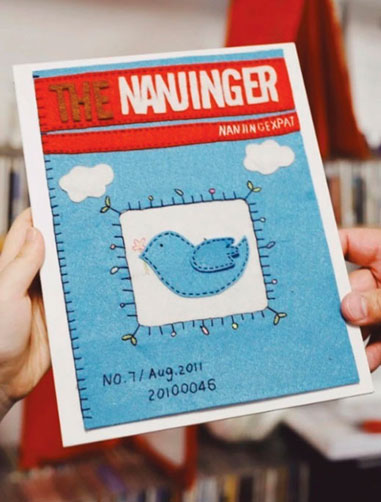Let’s talk about salt baby, let’s talk about you and me, let’s talk about all the good things and the bad things that can be, let’s talk about salt!
Salt sodium is one of the biggest killers in China and nobody knows it. While we know there are many factors that are involved with causes of hypertension (high blood pressure) in humans, sodium intake is one of the major players.
This year China has teamed up with the UK and launched the ASC (Action on Salt China) project, a health campaign that was launched in Beijing last month that is intended to last 4 years.
It is believed that the average Chinese person consumes 11 grams of salt every single day, which is said to be double the safe suggested amount set by the WHO. To gain a deeper understanding of present health risks of salt in China, the Nanjinger spoke with two medical professionals from international medical facilities in Nanjing.
Cardiologist Dr. Cheng of Guze Clinic in Nanjing’s Jiangning District spoke about the causes and dangers of hypertension, saying that, “A great lot of research has proven that the intake of too much sodium salt is one of the important risk factors [of hypertension]. Over 60 percent of hypertensive patients is salt sensitive in China. It is the genetic basis of high incidences of hypertension and pathophysiological changes in body are also involved. Therefore, the intake of too much salt sodium has a more serious impact on the risk of hypertension in China.
“ASC is good propaganda for preventing [hypertension], as taking medicine or doing operations means the problem is already there. It not only can push forward education on hypertension, but also can decrease the risk of getting the disease while China has a high rate of salt sensitive hypertensive patients”.
Speak to any Chinese person and they will tell you that the Chinese diet is the best in the world regarding taste, health, and satisfaction. As to taste, certainly, is it really true that Chinese food is as healthy as they say?
Dr. Barre Sy, faculty member of the UFH (United Family Health) Family Medicine Fellowship Program, and certified Family Physician Canada, puts modern Chinese food at the bottom of the food pyramid. “Although risk factors of hypertension are multi-factor, the Chinese diet is an important contributing factor to the cause of hypertension today. An increasingly ‘heavy taste’ in cooking among the Chinese population is definitely going in the wrong direction. Traditionally, there are many regional styles of food that range from mild tastes (relatively less salty) to very spicy tastes (high sodium content). This has changed as people have now embraced ‘heavy and spicy’ tastes that has resulted in mono-styles of food nationwide. So nowadays, it is common practice to see people adding chili sauce (100mg of chili sauce may contain 3.7g of sodium which is equivalent to 9.25g of salt) onto anything they put into their mouths. Mild food loses flavour and restaurants that sell healthy dishes tend to lose competitive edges. Another national phenomenon in recent years is the craving for instant noodles which are loaded with sodium and calories”.
According to Lu Jiapeng and colleagues in an article published in the British medical journal The Lancet, “Stroke is the leading cause of death in China, and is driven largely by uncontrolled hypertension. China’s story of putting research evidence at the very heart of policy making sets an important example for applying the best solutions to the most burdensome health problems, and fitting those solutions into a health service to bring about system change. The next vital step for China to continue to improve its health outcomes would be through the evaluation of policy change via robust research”.
In addition to ASC, in 2014 China began the Patient-Centered Evaluative Assessment of Cardiac Events (PEACE) Million Persons Project, thus far assessing and documenting the health of 1.7 million adults nationwide. The study has showed that of Chinese adults aged 35-75 years, nearly half have hypertension, fewer than a third are being treated, and fewer than one in twelve are in control of their blood pressure.
As to the reasons behind such data, Dr. Cheng commented, “The reasons are complex, one of them is people of China lack health knowledge and have no objective knowledge of hypertension and low treatment compliance. There is a Chinese saying ‘Medication is 30 percent poison’. This recognition has exaggerated the side-effects of medicines and ignores the treatment effect for the long term. Of course, any disease should not only rely on medication but in addition scientific evidence, a healthy diet, healthy lifestyle and good mental state and so on should be emphasised as the basis of medical treatment”.
Certified Family Physician Canada, Dr. Barre says, “As the Chinese society is becoming more affluent, people are eating more, walking less, exercising less and gaining weight. This is probably not a unique phenomenon in the world. I think a ‘healthy culture’ needs to be developed overtime to achieve ‘Healthy China 2030’. The recent invention of shared bicycles is a bright spot, it encourages more people to ride again. In all, only when a ‘healthy culture’ has been created, would people start look after their health. At the moment, health just isn’t the priority for most people EVEN when they got sick sometimes”.
With the emergence and popularity of delivery APPs, salty and spicy food, less activity and more partying and leisure, is it possible to really change the thought of the modern Chinese person in a timely enough fashion to help curb the problem?











